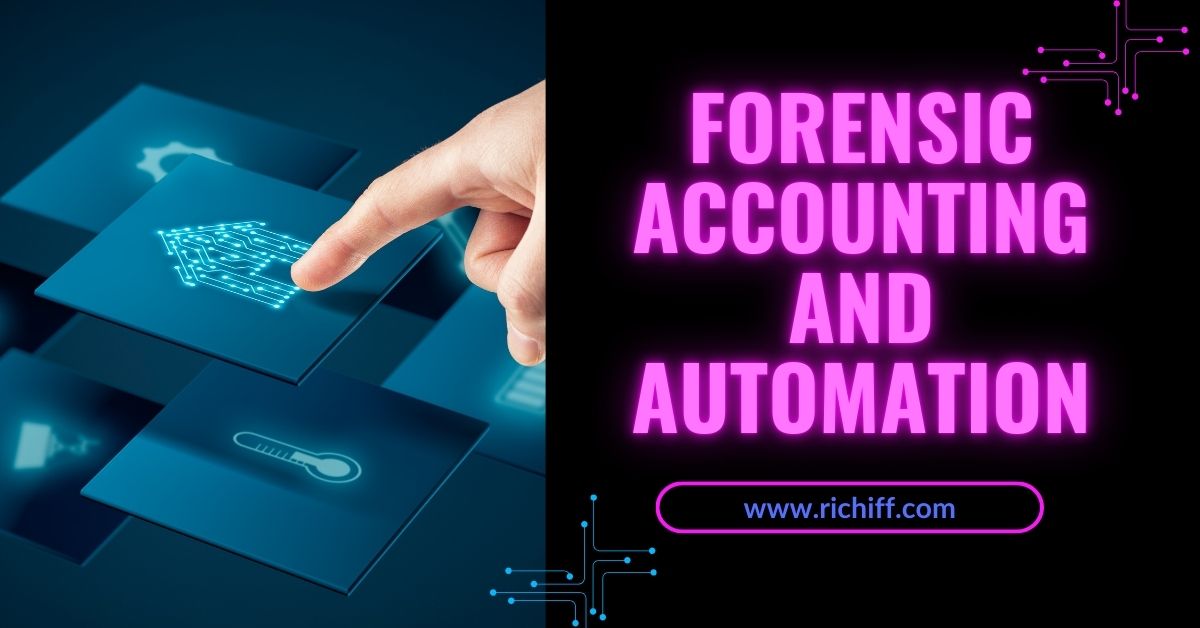In today’s world, where technology is transforming industries, forensic accounting is evolving too. The idea of forensic accounting and automation is gaining traction, and many are curious about how these changes are impacting the profession. But what does this really mean? Will forensic accounting become fully automated, or is there more to the story? Let’s dive into the details and answer these questions while exploring the role of automation in forensic accounting.
What is Forensic Accounting?
Imagine you’re a detective, but instead of searching for clues in a crime scene, you’re investigating financial records to catch a fraudster. That’s the core of forensic accounting—using accounting skills to uncover fraud, embezzlement, or any other financial crime. Forensic accountants often work on cases that end up in court, providing expert testimony based on the financial evidence they uncover.
But with the rapid advancements in technology, how has forensic accounting changed? Enter automation. With AI and data analytics, forensic accounting is becoming faster and more efficient. So, let’s break it down and explore what forensic automation actually looks like.
Forensic Accounting and Automation: The Perfect Match?
Automation has already made waves in industries like manufacturing and IT, and now it’s creeping into the world of finance. Will forensic accounting be automated? The short answer is: partially. Many routine tasks that used to take forensic accountants hours—like sifting through hundreds of transactions—are now being handled by software. But that doesn’t mean forensic accountants are out of a job. Instead, they can focus on more complex tasks that require human judgment.
What is Forensic Automation?
Forensic automation refers to the use of technology to automate data analysis, report generation, and fraud detection. For example, software like ACL and IDEA allows forensic accountants to analyze thousands of transactions within minutes, spotting patterns or discrepancies that would have been impossible to catch manually.
Automation is like giving forensic accountants a superpower. Instead of spending weeks on data analysis, they can now focus on piecing together the puzzle of financial fraud, interpreting the results that the software spits out. But while these tools are incredibly powerful, they still need the human touch to make sense of the findings.
The Rise of Forensic Accounting and Automation in India
In India, where financial fraud is a growing concern, the use of forensic accounting and automation is on the rise. Corporations, government agencies, and financial institutions are increasingly turning to forensic accountants to help detect and prevent financial crimes. With automation at their fingertips, these professionals are better equipped to handle the sheer volume of data they’re tasked with analyzing.
But this isn’t just limited to India. Globally, the demand for forensic accountants who understand how to leverage automation tools is skyrocketing. So, if you’re considering a career in this field, it’s worth understanding how technology is shaping its future.
How to Become a Forensic Accountant in an Automated World
Thinking about how to jump into this growing field? Here’s a quick roadmap:
- Education: Start with a degree in accounting, finance, or a related field. Many universities are now offering specialized courses in forensic accounting and automation, combining traditional accounting with the latest automation tools.
- Certifications: Getting certified as a forensic accountant can give you an edge. Consider certifications like Certified Fraud Examiner (CFE) or Certified Forensic Accountant (CFA) to show employers you’ve got the skills.
- Experience: The more experience you have, the better. But don’t worry if you’re just starting out—many firms are now looking for candidates who are comfortable with both accounting and technology, so a background in both will make you stand out.
What Technology is Used in Forensic Accounting?
The technology used in forensic accounting is evolving rapidly, and today’s forensic accountants have a range of tools at their disposal:
- Data Analytics Software: Tools like ACL, IDEA, and SAS can analyze large datasets, flagging suspicious transactions or inconsistencies that might indicate fraud.
- Artificial Intelligence (AI): AI can spot patterns in financial data that would be impossible for a human to detect. It’s like having a super-advanced assistant that learns and improves with every case.
- Blockchain: Blockchain technology offers a transparent and tamper-proof way to track financial transactions. It’s increasingly being used in forensic accounting to verify the authenticity of records.
- Machine Learning: This technology helps automate the detection of unusual transactions by learning from historical data and continuously improving its fraud detection capabilities.
Each of these tools is like an extra pair of hands, helping forensic accountants tackle the massive amounts of data they need to process. But it’s important to remember that these technologies are tools—they help, but they don’t replace the critical thinking and intuition that only a human can bring.
Will Forensic Accounting Be Fully Automated?
No, forensic accounting won’t be fully automated anytime soon. While automation can handle repetitive tasks, such as analyzing financial data or generating reports, it can’t replace human intuition and judgment. There’s still a strong need for forensic accountants to interpret the data and present it in a way that courts, regulators, and clients can understand.
Think of automation as a powerful tool in the forensic accountant’s toolkit. It enhances their work but doesn’t take over completely. So, if you’re worried about robots replacing forensic accountants, rest assured that the human element is still very much needed.
Forensic Accounting Jobs and Salary: What to Expect
With the rise of automation, forensic accountants are more in demand than ever before. The job market is booming, especially for those who are familiar with the latest technologies. Whether you’re in India or another part of the world, forensic accounting offers lucrative opportunities. The forensic accounting salary varies based on experience and location, but in India, professionals can expect to earn between ₹10 lakh to ₹25 lakh per year, while in the U.S., salaries range from $60,000 to over $100,000 annually.
FAQs About Forensic Accounting and Automation
1. Will forensic accounting be fully automated?
No, while automation helps with data analysis, human expertise is still necessary for interpreting results and providing expert testimony in court.
2. What is forensic automation?
Forensic automation refers to the use of advanced technology, such as AI and data analytics, to streamline the process of detecting financial fraud.
3. How can I start a career in forensic accounting?
Begin by obtaining a degree in accounting or finance, and consider pursuing certifications like CFE or CFA. Additionally, learning about the latest automation tools will make you more competitive in the job market.
Conclusion: The Future of Forensic Accounting and Automation
The world of forensic accounting and automation is rapidly evolving, and those who embrace these changes will be at the forefront of financial investigations. While technology is transforming the field, the human touch remains irreplaceable. Whether you’re an aspiring forensic accountant or someone interested in how technology is reshaping industries, now is the perfect time to dive into the exciting world of forensic accounting.
If you’re curious to learn more about this field, check out this comprehensive article on forensic accounting for additional insights.
You might also like: 32 Things to Know About Following The Simple Path to Wealth




